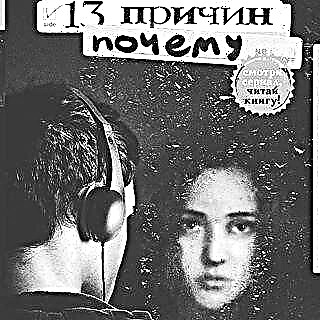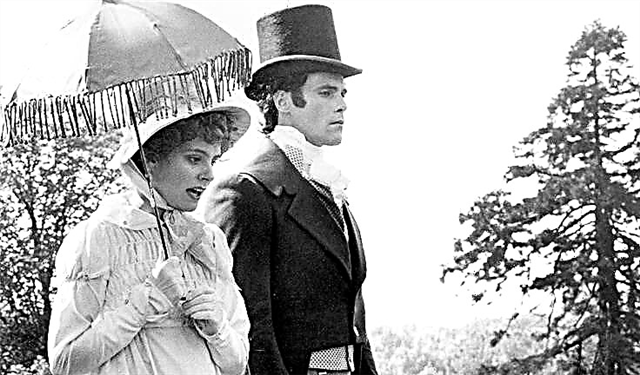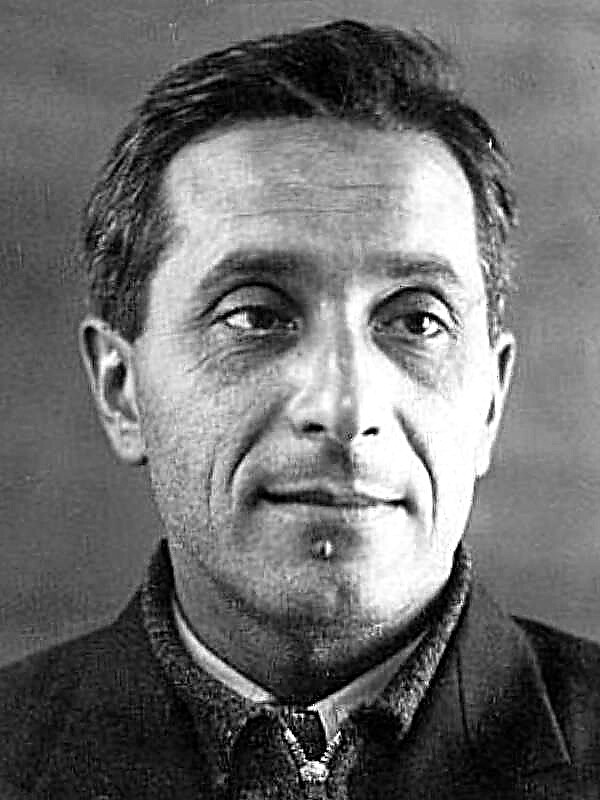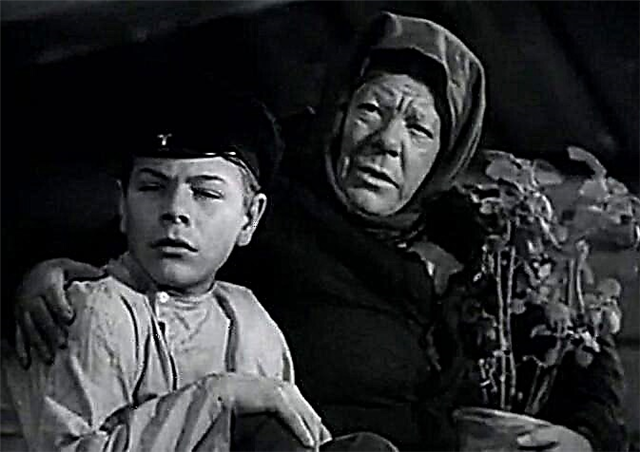Eliza, the daughter of Harpagon, and the young man Valera fell in love for a long time, and this happened under very romantic circumstances - Valera saved the girl from the stormy sea waves when the ship on which they both sailed wrecked. Valera's feeling was so strong that he settled in Paris and acted as a butler to Eliza's father. Young people dreamed of getting married, but an almost insurmountable obstacle stood in the way of fulfilling their dreams - the incredible stinginess of Father Eliza, who could hardly have agreed to give his daughter for Valera, who didn’t have a penny. Valera, however, did not lose heart and did everything to win the favor of Harpagon, although for this he had to break the comedy every day, indulging the weaknesses and unpleasant quirks of the miser.
The brother of Eliza, Cleanthe, was worried about the same problem as her: he was crazy in love with a girl recently settled in the neighborhood named Mariana, but since she was poor, Cleant was afraid that Harpagon would never let him marry Mariana.
For Harpagon, money was the most important thing in life, and his boundless stinginess was combined with an equally boundless suspicion - he suspected everyone in the world, from servants to his own children, of striving to rob him and deprive the kind of treasures from his heart. On that day, when the events described by us were unfolding, Harpagon was more suspicious than ever: he would have, because on the eve of his debt of ten thousand ecu had been returned. Not trusting the chests, he put all this money in a casket, which he then buried in the garden, and now he was trembling, as if someone had not heard about his treasure.
Picking up their courage, Eliza and Cleant nevertheless started a conversation with her father about marriage, and he, to their surprise, readily supported him; moreover, Harpagon began to praise Mariana: for some reason she is good, except that she is a dowager, but that's nothing ... In short, he decided to marry her. These words completely shocked the brother and sister. Cleant just got so sick.
But that was not all: Eliza Harpagon set out to marry the gentle, prudent and wealthy Mr. Anselm; he was fifty years old, and besides, he agreed to marry Eliza - think only! - completely without a dowry. Eliza turned out to be stronger than her brother and resolutely told her father that she would rather lay hands on herself than go for the old man.
Kleant was constantly in need of money — what the stingy father had given him was not even enough for a decent dress — and one day he decided to resort to the services of a moneylender. Broker Simon found a lender for him whose name was kept secret. He, however, did not lend money under the accepted five percent, but under the extortionate twenty-five, and besides, of the required fifteen thousand francs, only twelve were ready to give in cash, imposing some unnecessary belongings on account of the others, but Cleant did not have to choose and he went to such conditions. The lender was Cleant's own father. Harpagon willingly agreed to deal with a young rake unknown to him, since, according to Simon, he was in the very near future expecting the death of his rich father. When Garpagon and Cleant finally came together as business partners, there was no limit to the indignation of one or the other: the father angrily stigmatized his son for shamefully falling into debt, and his father's son for no less shameful and reprehensible usury.
Having driven out of sight Cleant, Harpagon was ready to accept Frozin, who was waiting for him, an intermediary in heart affairs, or, simply speaking, a matchmaker.From the threshold, Frozina began to scatter compliments to the elderly groom: at sixty, Harpagon looks better than other twenty-year-olds, and he will live up to one hundred years, and still bury his children and grandchildren (the last thought came to his heart). She did not pass praise over the bride either: the beautiful Mariana, although she is a dowager, is so modest and unpretentious that to keep her is only to save money; and she won’t be attracted to young men, since she hates them - give her at least sixty, so much so with glasses and a beard.
Harpagon was extremely pleased, but no matter how hard Frozina tried, she - as predicted by Cleant's servant, Laflesch - could not lure him a penny. However, the matchmaker did not despair: not from this, so from the other end she will receive her money.
In the house of Harpagon, something previously unprecedented was being prepared - a dinner party; Eliza's fiance, Mr. Anselm and Mariana, were invited to him. Harpagon here also remained faithful to himself, strictly telling his servants that God forbid not to introduce it into expenses, and to the cook (part-time coachman) Jacques to cook dinner more tasty and cheaper. Butler Valery eagerly echoed all the instructions of the owner regarding economy, thus trying to win the favor of his beloved father. It was disgusting to the sincerely devoted Jacques to listen to how Valery shamelessly sucked at Harpagon. Having given free rein to the language, Jacques honestly told the owner how the whole city was pacing about its incredible stinginess, for which he was beaten first by Harpoon, and then by a zealous butler. He accepted the beatings from the owner meekly, but he promised Valera to somehow repay.
As agreed, Mariana, accompanied by Frosina, paid Harpagon and his family a day's visit. The girl was terrified of the marriage her mother was pushing her at; Frozina tried to console her with the fact that, unlike young people, Harpagon is rich, and she will certainly die in the next three months. Only at Harpagon’s house did Mariana learn that Cleant, whose feelings she reciprocated, was the son of her old ugly groom. But even in the presence of Garpagon, who was not very smart, the young people managed to talk as if in private - Cleant pretended to speak on behalf of his father, and Mariana answered her lover, while Garpagon was confident that her words were addressed to him. Seeing that the trick was a success, and from this emboldened, Cleant, again on behalf of Harpagon, presented Mariana with a diamond ring, removing it directly from her father's hand. He was beside himself with horror, but did not dare to demand a gift back.
When Harpagon briefly retired on a hasty (money) business, Kleant, Mariana and Eliza had a conversation about their heart affairs. Frozina, who was present right there, realized the difficult situation the young people were in, and felt sorry for them. Having convinced the youth not to despair and not to yield to the whims of Harpagon, she promised to come up with something.
Returning soon, Harpagon found his son kissing the hand of his future stepmother and worried if there was any trick. He began to question Kleant how his future stepmother had come, and Kleant, wanting to dispel his father's suspicions, replied that upon closer examination she was not as good as at first glance: her appearance was supposedly mediocre, she had a cunning appeal, her mind was the most ordinary . Here it was the turn of Harpagon to resort to tricks: it is a pity, he said that Mariana did not like Cleanthe - after all, he had just changed his mind about getting married and decided to give his bride to his son. Kleant fell for his father's trick and revealed to him that he had actually been in love with Mariana for a long time; this was what Harpagon needed to know.
A fierce skirmish began between father and son, which did not end with the assault only thanks to the intervention of the faithful Jacques.He acted as a mediator between father and son, misinterpreting the words of another to one, and so he achieved reconciliation, however short-lived, since, as soon as he left, the rivals figured out what was happening. A new outbreak of quarrel led to the fact that Harpagon renounced his son, deprived him of his inheritance, cursed and ordered to get away.
While Cleant did not fight too successfully for his happiness, his servant Lafles did not lose time - he found in the garden a box with Harpagon's money and stole it. Finding the loss, the miser nearly lost his mind; in the monstrous theft, he suspected everyone without exception, almost even himself.
Garpagon said so to the police commissioner: any of his family members, any of the residents of the city, any person in general could have committed the theft, so everyone should be questioned in a row. The first to turn to the investigation was Jacques, who thereby unexpectedly had the opportunity to avenge the sneak-butler for the beatings: he showed that he had seen in his hands the treasured Garpagonova box.
When Valera was pushed against the wall with an accusation of abducting the dearest that Harpagon had, he, believing that it was, without a doubt, Elise, admitted his guilt. But at the same time, Valery fervently insisted that his act was forgivable, since he committed it from the most honest motives. Shocked by the arrogance of a young man who claimed that money, you see, could be stolen from good faith, Harpagon nevertheless stubbornly continued to believe that Valera confessed precisely to stealing money - he was not at all embarrassed by the words about the unshakable virtue of the box, about Valera's love for her ... The veil fell from his eyes only when Valere said that the day before he and Eliza had signed a marriage contract.
The harpoon continued to rage when Mr. Anselm, who was invited to dinner, appeared at his house. Only a few remarks were required in order to suddenly reveal that Valera and Mariana are brother and sister, the children of the noble Neapolitan don Tomaso, now living in Paris under the name of Mr. Anselm. The fact is that don Tomaso was forced to family to flee from their hometown; their ship fell into a storm and drowned. Father, son, mother and daughter all lived for many years with the confidence that other family members died at sea: Mr. Anselm even decided to start a new family in his old age. But now everything fell into place.
Harpagon finally allowed Eliza to marry Valera, and Cleanth to marry Mariana, provided that he would be returned the precious box, and Mr. Anselm would cover the costs of both weddings, give Garpagon a new dress and pay the commissioner to draw up a protocol that turned out to be unnecessary.












